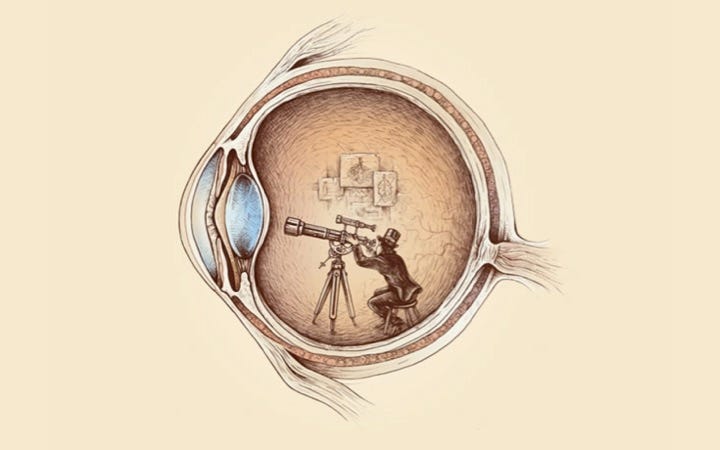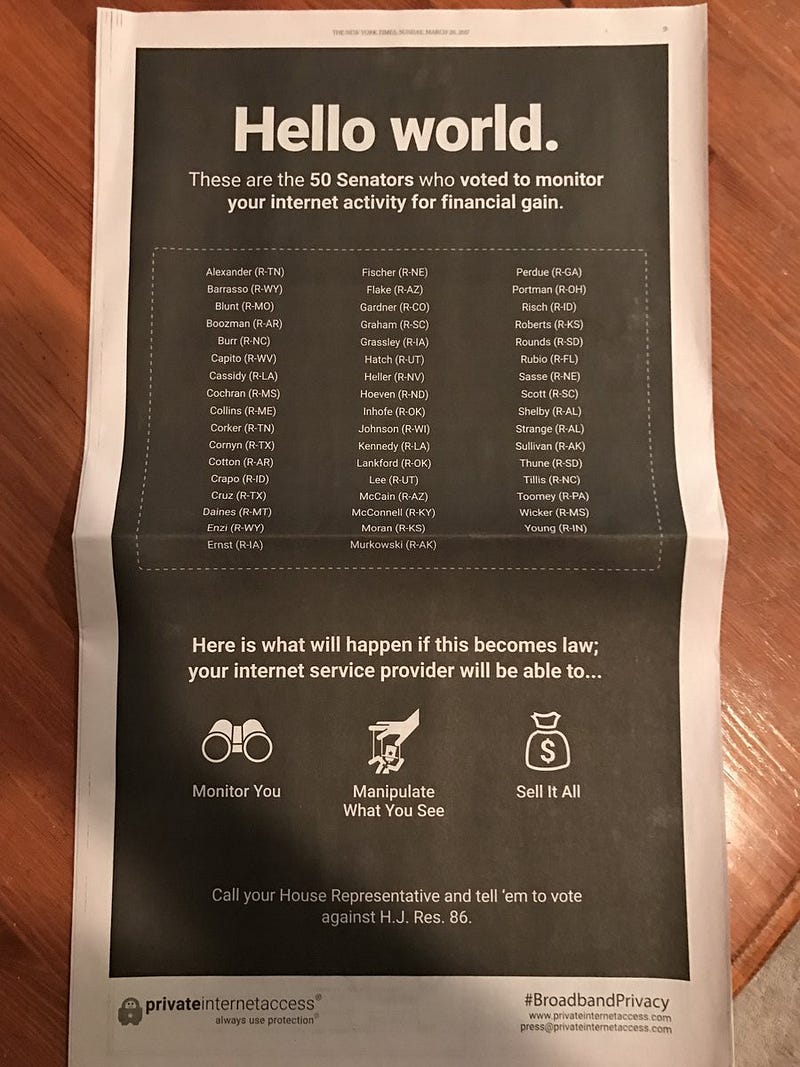
The eyes are the windows to the Soul — Proverb
It is hard to find an accurate statistic of how much communication is nonverbal. I have read 93% of all daily communication is nonverbal, also 75% and 90%.
Some deep research was done by the author of the 1971 book Silent Messages Dr. Albert Mehrabian and he found that 7% of any message is conveyed through words, 38% through certain vocal elements, and 55% through nonverbal elements (facial expressions, gestures, posture, etc). Subtracting the 7% for actual vocal content leaves one with the 93% statistic.
For the sake of this Thursday Thought let’s not dwell on the exact percentage, but let’s accept that most communication is non-verbal. Specifically, let’s see that 55% is done through facial expressions, including the behaviour of the eyes.
Avoiding the (Snapdoor) Trapdoor
What if Snapchat were a data company?
“Eh Duh, all companies are data companies”, I hear you say.
Bear with me on this one, I mean a totally different type of data company.
Snapchat is generating revenue, but still a long way from the 4 horsemen Google, Facebook, Apple and Microsoft. Snapchat is only a few chess moves from becoming the next Twitter or a plethora of others. Facebook (via Instagram) has launched an all out competitive assault on Snap with a slew of snap-like features. After refusing the $3 billion offer by Facebook, Facebook realised all they were buying was time, they realised they already have the audience, they already have the clients, all they had to do was add snapchat features.
Most marketers and agencies don’t want to have to deal with the nightmare fragmentation that exists in the market. Most marketers and agencies are time-poor or don’t want to learn new platforms so stick to what they know. When they have one point of contact and can cater for many needs via one touch point they will. This is why Facebook will eventually eat further into TV and Radio ad spend (Facebook live, Facebook audio and Facebook soccer — the recent MLS deal). I am going down a rabbit hole here so I will stop at that, you get the picture: Snap needs a differentiated revenue stream.
The Face-Tracking Boiling Frog

There is a metaphor that goes like this. If you place a frog gently in a pot of cold water and gradually simmer the water, the frog will float there quite placidly. As the water heats up, the frog will not notice the slow rise in temperature. It will grow used to the gradual change and will eventually allow itself to be boiled to death.
This is a great metaphor for how technology is progressing slowly around us and often times we don’t even notice.
This is the case with the gradual introduction of facial tracking and eye tracking.
Snap’s Facial Recognition
Many people love playing with the cool filters or lenses in Snapchat, which morphs your face into a myriad characters and combinations. Your face is captured using advanced facial recognition. The tech came from a $150M acquisition of Ukranian startup “Looksery”. The tech was trained and is continually trained by scanning countless faces that were manually marked with points to show where the eyes, nose, mouth and whole face area and then creates a mask.
As Scott Galloway told us on the Innovation Show all successful tech platforms are Benjamin Buttons, they get better with use, they learn, they improve, they iterate and they adapt to use. So, Snap gets better every time it is used and not only that, it collects the facial data of users every day.
Great fun for all the millions (not sure of the figure) of people who train the system and input their “Data” every day, right?
Sins of the Finger?

Due to a recent decision by U.S. Congress, U.S. Internet Service Providers (ISPs) can legally sell your entire web browsing history to anyone they want, without your permission. So every mistake you’ve ever made online could be up for sale.
ISPs can also sell any information they want — financial information, medical information, children’s information, social security numbers, geolocation — even the contents of your emails.
On this week’s Innovation Show I talk to freeCodeCamp founder Quincy Larson about this and how to protect your privacy. Thanks to Quincy for the details on this law. His full post is available at the link below.
Things are so bad that VPN company Private Internet Access paid $600,000 to run this full-page ad in The New York Times — even though they would profit hugely from this since everyone will need a VPN.
Snap out if it — Take off the tinfoil hat!

So, back to this week’s train of thought.
Knowing how valuable data can be in providing context to advertising and increasing advertising rates, imagine the value of facial data to a government?
Thinking of the boiling frog, have you noticed how much more often you get your eyes scanned as you travel? Showing your passport is increasingly accompanied or even replaced by eye or facial scanning.
Bear in mind how much effort advertisers go to in order to create accurate profiles and online behaviours of (potential) clients/customers, now imagine if you could have access to Snap’s rich database of facial data add this to the huge amount of (free and paid-for) services where we store our digital photos and tag who is in them. This makes for great profiling.
The glass is also half full as this is a fantastic help in capturing terrorists, murderers and recognising threats to society.
Eyefluence
Google recently acquired Eyefluence, a startup founded in 2013. Eyefluence is a great play for the forthcoming age of Augmented, Virtual and Mixed realities. In this age, everyone will wear headsets, eyewear or lenses.
Eyefluence actually tracks the eye to pre-empt intention. Like any Benjamin Button product it learns the more it is used. So it learns the behaviour of the user. The user can control games (such as whack-a-mole) with their eyes, no more need to clumsily fumble with the headset let alone and archaic mouse. It can tell if the user is afraid, amused, elated or aroused, such tech can even establish early if someone has autism.
When you think where privacy can be taken to or “from”, we need to thread carefully with the choices we make. At the time when you watched such great movies as ‘Minority Report’, they may have appeared far fetched, the whole idea of pre-crime and government eye tracking leading to Tom Cruise getting an underground eye transplant seemed like absolute science fiction. As with all advancements in a world of boiling frogs, science fiction is blurring more and more with science fact.
Tech should be the Servant, not the Master
All this technology is phenomenal from a technological standpoint. According to recent Innovation Show guest Robert Scoble, Eyefluence is currently working on a virtual keyboard, where future Thursday Thoughts will be written with my eyes — nice!
However, like with Robots, with automation, with data the human must stand up and be counted. It is our responsibility to control the tech we create.
While I am all for huge profits and wealth generation, if all the world’s wealth in concentrated in only a handful of companies in the future, then the power is concentrated there also. All 4 horsemen are pretty much already machine learning / AI companies or fast becoming them. Smaller players (like Eyefluence was) are increasingly becoming parts of them.
All of these choices are ones to be made by man and not machine. The tech is there to enable us, to make things better, free us up for more cognitive tasks, let’s use the tech as a servant and not let it become the master,
“The lucky few who can be involved in creative work of any sort will be the true elite of mankind, for they alone will do more than serve a machine.” — Isaac Asimov
If you like this blog please hit the thumbs up so others can see it.
EP 32: Privacy, Tracking, VPNS and IT@Cork
On this weeks Innovation Show:
Founder of freeCodeCamp Quincy Larson gives us some low hanging fruit of how to protect our data, including browsing data. He tells us how to set up a VPN and some simple hacks to improve personal security.
Blogs referred to: Set up a VPN in 5 minutes
We talk to Anthony O’Callaghan, Director of Analytics and Artificial Intelligence for Johnson Controls. Anthony is vice chair of Cork@IT and gives us a quick download of what the non profit does and about the upcoming event in Cork. https://www.itcork.ie/event/tech-summit-2017/
As always show is available below on the following platforms:
You can subscribe on iTunes here.
Website is here.
TuneIn is here.
Soundcloud and Google play are below.